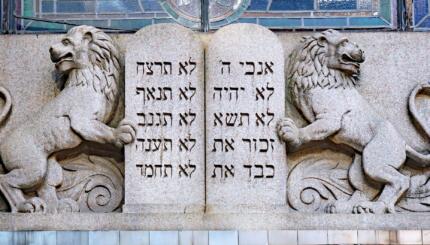Samuel I 15:2-34
Parashat Zakhor is read on the before every year. It includes a verse commanding us not to forget Amalek, the tribe who attacked the Israelites just after they came out of Egypt. In addition to its regular place in the Torah, in Parashat Ki Tetze, Parashat Zakhor is read on the Shabbat before Purim because the villain of the Purim story, Haman, is said to be a descendent of Amalek. Hearing Parashat Zakhor in synagogue is considered the fulfillment of the not to forget Amalek.
The haftarah for Parashat Zakhor tells of the efforts of Israel to defeat Amalek once and for all. God commands Saul, the first king of Israel: "I remember what Amalek did to Israel, attacking them on their way, as they left Egypt. Go, now, and attack Amalek" (15:2-3).
Saul does as God commands. At the city of Amalek, he finds a tribe of Kenites living among them. Since the Kenites had been occasional allies of the Israelites, as well as the tribe that Jethro and Yael both came from, Saul warns them to move out of the Amalekite city, lest they be destroyed together with the people of Amalek. The Kenites comply, and Saul rages a furious war on Amalek, "taking Agag king of Amalek alive while putting all the rest of the people to the sword" (15:9). Along with Agag, Saul and his army take Amalek’s animals and their valuables.
But God is displeased that Saul did not kill Agag and destroy everything belonging to Amalek. "I regret that I made Saul king of Israel," God mourns (15:11), and though Saul repents, he still does not kill Agag and the Amalekite animals . The prophet Samuel comes to visit, and when Saul claims to have carried out the Lord’s command, the prophet challenges him: "How is it, then, that I hear sheep bleating and oxen bellowing?" (15:14).

Help us keep Jewish knowledge accessible to millions of people around the world.
Your donation to My Jewish Learning fuels endless journeys of Jewish discovery. With your help, My Jewish Learning can continue to provide nonstop opportunities for learning, connection and growth.
Saul excuses his reticence by explaining that they were being saved as a sacrifice to God.
"You may be small in your own eyes," Samuel tells Saul, "but you are the head of the tribes of Israel; the Eternal anointed you king" (15:17). Samuel goes on to castigate Saul, telling him that although he repented, he still rejected the word of God; and that, therefore, God has rejected him as king of Israel. What’s more, God has "given it [the kingship] to your neighbor, to one better than you" (15:28). Saul, though disgraced, asks Samuel’s permission to pray to God with him–and the prophet agrees.
Following their prayers, Samuel demands that Agag, the king of Amalek, be brought before him. Samuel takes a sword and chops Agag to pieces. Samuel then leaves Saul, and withdraws to his home in Ramah.


